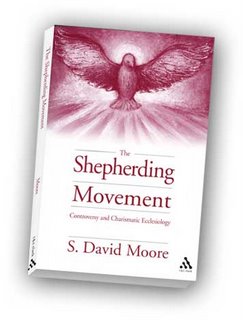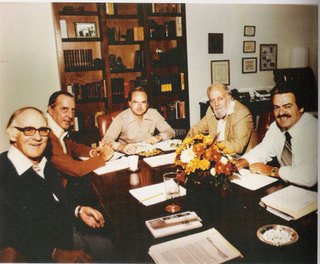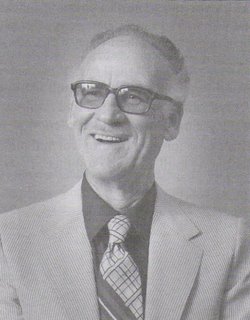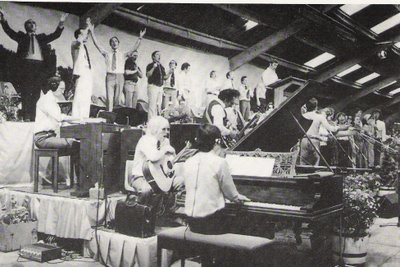Learning the Lessons from "The Shepherding Movement" by S David Moore.
 While this is partly a book review, it may turn out to be somewhat of a more extended reflection on the vitality of recognising leadership. "The Shepherding Movement" by S David Moore is an excellent book that will appeal on many fronts.
While this is partly a book review, it may turn out to be somewhat of a more extended reflection on the vitality of recognising leadership. "The Shepherding Movement" by S David Moore is an excellent book that will appeal on many fronts.It is a scholarly work (the author is a Professor in California), it is a sympathetic work (the author used to be personally involved in the Shepherding Movement), it is a systematic work (the author has taken great pains to ensure historical fact and the bibliography is 20 pages long!) and it is a significant work (the author was granted interviews with Charles Simpson, Bob Mumford and many of the key players in the Shepherding Movement).
I have now read it a number of times and read it firstly for a learning experience, secondly to absorb Ern Baxter's contribution to the Shepherding Movement but thirdly to learn the lessons from history and see where these outstanding men fell short, and by learning we can go further. Regular readers of this website may be forgiven sometimes for thinking that I see Ern Baxter is almost infallible! On many fronts, I have argued that Ern Baxter was incredibly prophetic for his time and his teaching has gone beyond our experience today as charismatics. Yet there are areas where we can benefit from his foundational work and yet go further in our vision of the Kingdom of God. He would expect nothing less.
A. An Outline of the Book.
The author takes a largely chronological format beginning with some time in the foreward to establish his credentials. Why is the book important? "The story of the Shepherding movement provides the contemporary church ... with a highly relevant chronicle of the challenges and problems that involve the renewal and revitalization of church structures" (p4). There should be personal benefits too to reading this book; "Studying the Shepherding movement's successes and problems in its attempts to provide an environment for practical discipleship and spiritual formation may help today's church do a better job in producing devoted followers of Jesus" (p5). Surely that should interest any reader - charismatic or not!
In terms of sources, the author wrote that; "essential for an accurate history of the Shepherding movement is a complete collection of New Wine. The magazine published from 1969 through to 1986 was the principal publishing voice of the five teachers and the movement". It is exciting therefore to note that Terry Virgo wrote that it is the intention of the Charles Simpson Ministry to put articles from the New Wine magazine onto their website. The other key source from this era is of course the audiotape. He wrote; "The Shepherding movement blazed a trail in the use of audiotaped Bible teaching. Millions of tapes were distributed over the years. I was able to secure more than a thousand relevant tapes".
He then begins with the fascinating historical facts as to how Charles Simpson, Ern Baxter, Bob Mumford, Don Basham and Derek Prince came together. Somewhat like Newfrontiers, they came together because of the dramatic experiences of the Holy Spirit that were sweeping the United States in the 1960's. They saw a need to bring Bible teaching into the charismatic experience that was happening. Their desire for accountability and relationship occured out of a tragic moral fall by a Bible teaching they were working with who's secret sin was previously unknown to that point. They covenanted together that; "Not one of us is immune from the deception that trapped Eldon ... when ministries are submitted to no one, answerable to no one, they too often stumble".
Moore then went on to speak of each of the Five's personalities and giftings. Don Basham's gifting was in editoral writing and journalistic skills. "He was the force behind New Wine Magazine" (p35). His ministry included an emphasis on deliverance from demonic power. Ern Baxter was the "oldest and more experienced of the five leaders ... Baxter was the most theologically orientated of the five men, using his extensive library to root himself in the Reformed tradition, along with his classical Pentecostal background" (p36). Moore wrote that Ern Baxter was an orator who used words as artistic tools and in the pulpit painted magnificent pictures. He had an extensive library where he would spend hours and often entire days in study. Bob Mumford was "the catalyst and celebrity of the Shepherding movement". He was seen commonly as a gifted and enthusiastic teacher. Derek Prince was "a Bible teacher of precision and skill". Like Basham he had an emphasis on deliverance from demonic power but also held a passion for Israel. Finally Charles Simpson became the primary administrator and manager of the Five. He was accepted as the most "influential shaper of the Shepherding Movement" and the leader of the Five.
Much of the book is obviously devoted to the controversies that arose due to the excesses that some of the Five's followers fell into. The inital controversies began because of Basham and Prince's empasis on demonic deliverance. This was small however and localised. The heights of the Shepherding Movement were the two conferences firstly at Montreat in 1974 and then Kansas City in 1975 where Ern Baxter preached the unforgettable sermon; "Thy Kingdom Come". Moore wrote; "Kansas City ... was a powerful expression of unity among Charismatics ... the evening meetings had more than 45, 000 in attendance ... The movement's 1977 success in the face of two years of controversy had helped create the triumphalistic tone ... It was a heady time for the Shepherding Movement".
So to the controversies. Moore suggested that it was fear that led to the controversies becoming open discussion and debate with the leaders. After the Montreat Conference 1974, many national church leaders "felt threatened ... they were afraid that these guys were running away and getting a lockhold on the leadership of the whole Charismatic movement". It was the famous TV figure Pat Robertson who first decided to take the Five and their doctrines on. One point to note is that Pat Robertson did not follow the principles of Scripture in confronting the Five. Matthew 18:15-17 makes it quite clear that it is appropriate first to approach the brother you have a problem with privately first. A public approach is of last resort. Robertson on the other hand; "wrote an open letter to Bob Mumford ... copies of which were sent to many prominent Charismatic leaders".
There is much detail in the book about meetings between the Five brothers and other Charismatic leaders and it is evident that there was much heat to the meetings. Moore cited Ern Baxter as writing; "These were painful things to here since we felt that none of them (the accusations of error) were true ... I felt more grieved at the manner in which we were attacked than hurt by the attack itself ... I was not prepared for the kind of hostile and prosecutional attitudes demonstrated by some of our opponents" (p103). The meetings often reached stalemates because the charges and accusations were levelled at the Five brothers, who replied as best as they could in all honesty, but were told that they were not believed. It is difficult to see how anyone could respond to such hostility.
It is sad that the historical events make it clear that the controversies were of such heat that Simpson, Baxer, Basham and Mumford (Prince had taken an independent road a few years earlier) felt unable to continue to put into practice much of what they believed. It is clear that they felt hugely responsible for the excesses and errors put into practice under their oversight and bore that responsibility heavily. It seems to me that Moore made it clear that the closing of the New Wine magazine in 1986 was a key moment for each of the brothers taking a more independent line in their ministries although they remained close friends. It is thrilling that so many years on after this, the Charles Simpson Leadership Conference saw Bob Mumford and Charles Simpson ministering together for the first time in 20 years.
B. Lessons Learnt from the Book.
Prof Moore does have a number of reflections for the reader to learn from the Shepherding Movement and it is these that I would like to add some commentary to.
"1. The movement grew too fast and exceeded it's ability to produce trained and qualified leaders for the task".
It seems to me that history teaches us again and again that movements of God have caught the church off-guard and when the Spirit has moved, the wineskins simply are not adequate enough to cope with the new wine that is coming from heaven. It is essential that due care and attention is given to the principles and values that we hold and hence why books such as John Hosier's "Christ's Radiant Church" are so important for structuring our beliefs on leadership and church life.
"2. The movement's leaders failed to recognise the downside of an authoritarian approach .. Human carnality got the best of some leaders who used their authority in self-serving ways without sufficient or timely redress".
While there is authority, there will always be abuse of it. This doesn't allow for an ignoring of church authority - it is biblical! But it demonstrates to me the vitality of a true apostolic movement that will ensure that checks are in place for leaders to not be able to abuse their authority without someone asking questions. We should get nervous if we see a leader who has such a personality cult that we suspect he considers himself immune from accountability.
"3. The movement's ideology forced the five teachers into apostolic and pastoral roles for which they were not called or prepared".
This, to me, is the major area where the five teachers fell short of their calling. Ern Baxter had an apostolic calling - of that there is no doubt. Throughout his life church leaders flocked to him looking for oversight and covering. His ministry was mobile and he was constantly looking to "regions beyond". In short he fulfilled all of the five criteria of an apostle that David Holden identified. Yet he (and the other brothers) seemed very reluctant to acccept that mantle. Maybe it was humility. Maybe they didn't believe they really had that gifting. But Paul says, "By the grace of God I am what I am". Humility aside, there is a place for recognising that the ascended Christ has given gifts of leadership to His church and if a leader has that gifting, it is not because of any human achievement. It is rather a calling to serve God's church and the parable of the talents makes it quite clear that God doesn't look kindly on men who hide their talents in the ground because of "humility".
"4. The movement's emphasis on authority, submission and servanthood had a way of silencing dissent. The highly personal, hierarchial, pastoral relationships made it difficult to disagree and challenge one's pastor without appearing disloyal".
Can a pastor make a mistake? Can a church leader get it wrong? Surely if what he says is contravening the Word of God then it clearly is evidence that he can. But the question remains how can the tension be held in a church member disagreeing respectfully with a pastor and yet remaining loyal and under authority to him? It is an incredibly difficult situation that I have experienced personally. This surely is where humility does have a part to play, and church leaders should be careful of exerting their authority into areas where the Word of God is not clearly addressing an issue.
"5. It simply was impossible to keep five strong independently successful leaders together".
I am so grateful to God for a movement of churches like Newfrontiers that demonstrate that this actually is possible. While Terry Virgo fathers the movement, he is not a classic personality cult. He doesn't shout or cry or cackle in preaching like some preachers, yet the authority in his style is undeniable. The other leaders on the apostolic team seem quite able to work together because there is a common goal and vision. I wonder if the problem with the Shepherding Movement was not that they were five strong independent leaders but rather that they did not have a clear, concise vision of where the churches they were leading were going? Hence each leader would lay his own style on the men who related to him? This is pure speculation as I have not had the opportunity to ask whether this is so.
And so ...
Moore concludes, "History tells us that people and movements once rejected are sometimes only appreciated generations later. For the Shepherding Movement only time will tell". This book is an excellent tool for any who are interested in getting a clearer understanding of how Ern Baxter and his brothers worked. I highly recommend it. It is a scholarly work but incredibly easy to understand and very readible. It is my hope that time is already healing the wounds of those abused by heavy shepherding and that we will begin to be able to address this again in churches - this is why I was so thrilled with Terry Virgo's closing address to the Brighton conference. If the end-time glorious church is truly to arise and let her light shine, then we desperately need Christ's Ascension Gifts of Leadership everywhere and in every place.









